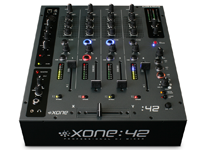
Allen & Heath Xone:42
A good DJ mixer is the heart of your DJ setup. All your audio sources end up here, and this is where you will spend a good deal of time during your mix. A mixer is the control panel for changing and mixing the audio that is fed into the mixer. The mixer has a set number of channels for audio input. These channels normally have a 3 or 4 band equalizer (EQ) a volume fader. The EQ allows a DJ to change the volume of various frequencies (Lows, Mids, Highs on a 3 band EQ) of the audio input. These channels are mixed together and come out through a master output. There is also a capability to monitor the mix through the headphones on the fly. DJ software can do its mixing within the program or externally.
A mixer may seem very complicated at first glance, but after familiarizing yourself with the components you should be able to understand how each DJ mixer will work by simply looking at it.
The basic components of a DJ mixer:
- Channels for audio input from an external CD player, turntable, or another audio source. Normally between 2-4 channels.
- EQ’s on each channel – normally 3 band.
- Volume Faders or Knobs on each channel.
- Microphone Input Channel
- Master Audio Output
- Monitor Audio Output
- Crossfader
- Headphone Monitor Channel
Some higher end mixers feature built in features like:
- Effects and Filters
- Samplers
- Audio Interfaces
Choosing the right mixer for your style is very important. Make sure you take into consideration the amount of devices you will be attaching to your mixer and if you need any advanced features like effects.
DJ Mixer Manufacturers
- Allen & Heath
- American Audio
- Behringer
- Denon
- Ecler
- Gemini
- Numark
- Pioneer
- Rane
- Stanton
- Vestax

